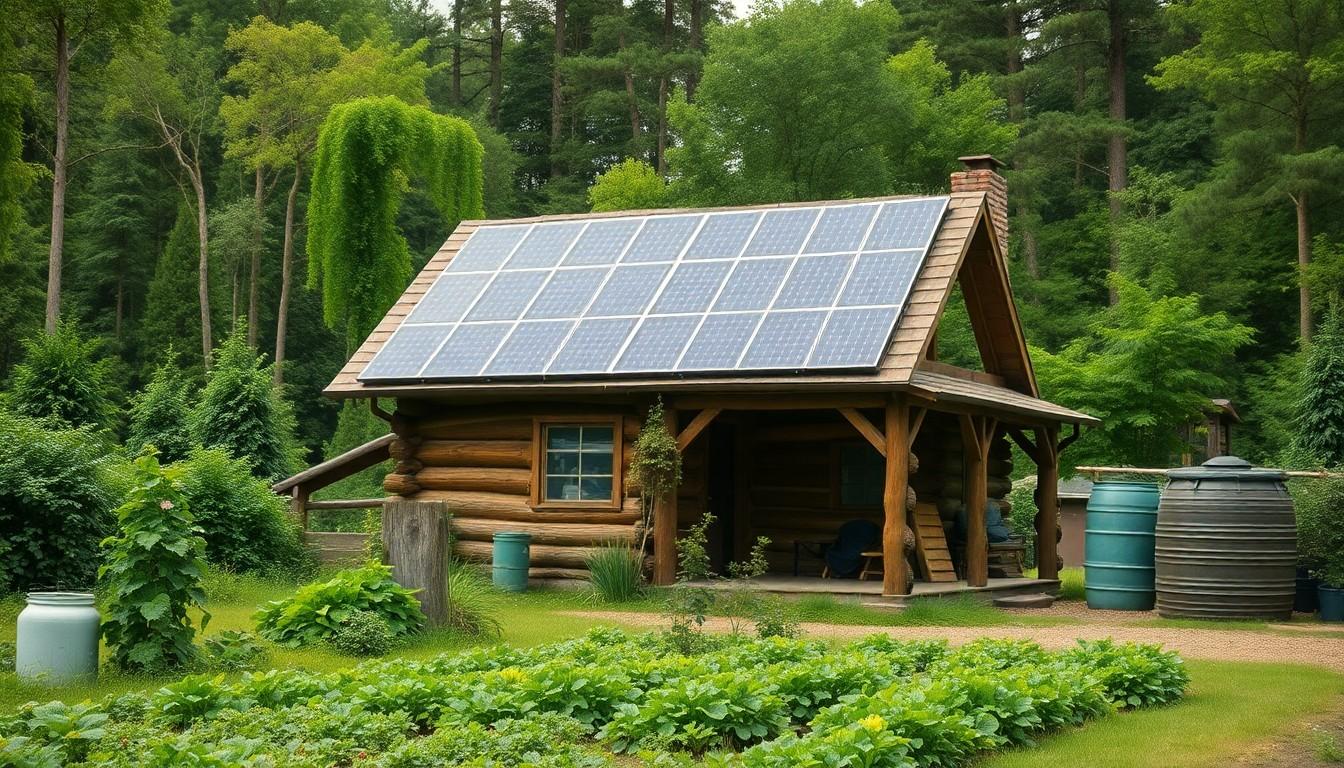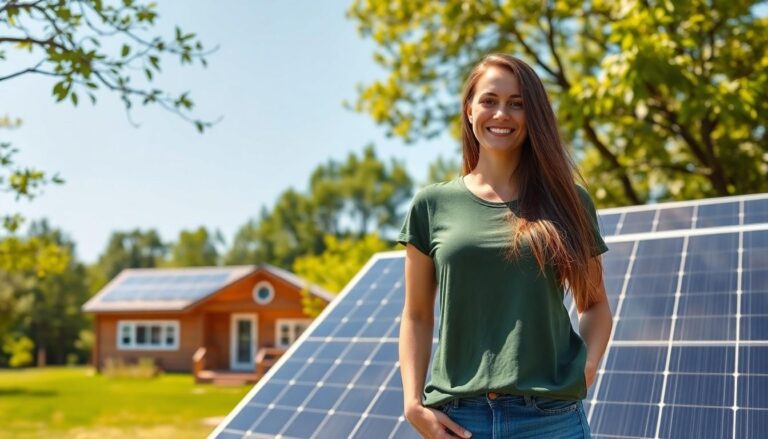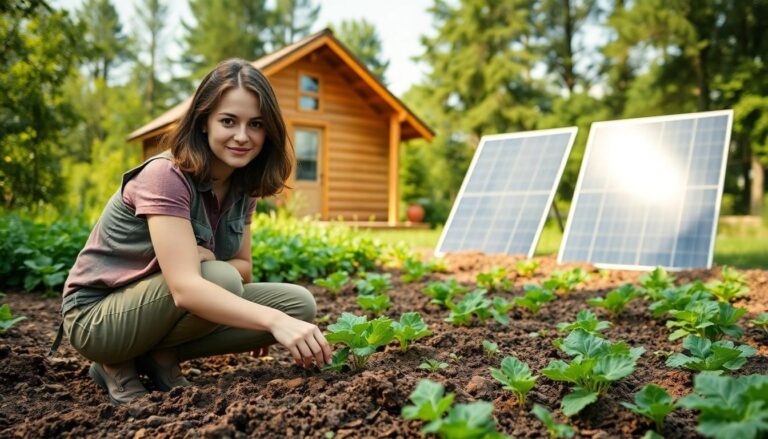Imagine waking up to the sound of birds instead of alarms, sipping coffee brewed over a crackling fire, and living life on your own terms. Off-grid living isn’t just a trend; it’s a lifestyle choice that offers freedom from the daily grind and a chance to reconnect with nature. Whether you’re dreaming of a cozy cabin in the woods or a tiny home on wheels, the possibilities are endless—and sometimes a little wild.
Off Grid Living Ideas
Exploring various off-grid living ideas enhances self-sufficiency and sustainability. Many individuals opt for solar power systems to harness energy from the sun, reducing reliance on traditional electricity sources. Rainwater collection systems offer another sustainable solution, capturing water for drinking and irrigation.
Building a tiny home promotes minimalist living, providing comfort with a smaller environmental footprint. Some choose to grow their own food in gardens or greenhouses, ensuring access to fresh produce year-round. Composting toilets represent an eco-friendly waste management option, significantly minimizing environmental impact.
Creating community spaces fosters connection among off-grid dwellers. Many find value in sharing resources, skills, and experiences with like-minded individuals. Incorporating permaculture techniques helps sustain soil health and increases biodiversity, benefiting both people and the planet.
Alternative heating systems, such as wood stoves, provide efficient warmth during colder months. Innovative designs for outdoor kitchens promote cooking while enjoying nature. Using reclaimed materials in construction not only saves costs but also contributes to environmental preservation.
Developing a backup energy solution, like wind turbines, offers additional reliability in energy supply. Investing in high-efficiency appliances reduces power consumption and maximizes sustainability efforts. Exploring these ideas empowers individuals to embrace a fulfilling off-grid lifestyle, aligned with personal values and environmental stewardship.
Benefits of Off Grid Living

Living off grid presents significant benefits that appeal to many individuals. From reduced environmental impact to cost savings, this lifestyle fosters independence and sustainability.
Environmental Impact
Choosing off grid living drastically reduces one’s carbon footprint. Utilizing renewable resources like solar energy minimizes reliance on fossil fuels. Collecting rainwater for daily use promotes water conservation. By growing food in gardens, individuals support local ecosystems while reducing transport emissions. Composting toilets effectively manage waste without harmful chemicals. Embracing sustainable practices actively contributes to the preservation of natural habitats. Overall, adopting an off grid lifestyle cultivates an eco-friendly environment that benefits future generations.
Financial Savings
Off grid living enables remarkable financial savings for many. Eliminating electricity bills occurs through the use of solar panels and other renewable energy systems. Growing personal gardens reduces grocery expenses, leading to healthier food choices. Collecting rainwater lowers water utility costs, providing a sustainable resource for irrigation and personal use. Minimal home designs decrease maintenance costs and reduce property taxes. Individuals can focus on generating their own energy, resulting in long-term savings. Investing in energy-efficient appliances further enhances financial benefits, aligning with a sustainable lifestyle.
Essential Components of Off Grid Living
Off-grid living relies on several essential components to ensure self-sufficiency and sustainability. Understanding these elements helps individuals create a harmonious and independent lifestyle.
Water Supply Solutions
Collecting rainwater provides an effective way to secure freshwater. Implementing a rainwater catchment system fills storage tanks for household use, irrigation, and drinking water. Filters ensure water cleanliness, while regular testing maintains safety standards. Digging a well is another option for direct groundwater access, often providing a reliable supply year-round. Utilizing water conservation practices, such as drip irrigation and greywater recycling, minimizes waste and enhances resource efficiency.
Energy Sources
Solar panels have become a popular choice for generating renewable energy. Utilizing photovoltaic systems captures sunlight to power homes and appliances efficiently. Wind turbines serve as an alternative, harnessing natural wind currents for energy generation. Hybrid systems often combine both solar and wind energy to enhance reliability. Additionally, using backup generators ensures power availability during cloudy or low-wind days. Investing in energy-efficient appliances reduces overall consumption, further benefiting off-grid living.
Sustainable Food Production
Growing food in gardens elevates sustainability and promotes self-sufficiency. Raised beds or container gardening maximizes space while improving soil quality. Incorporating perennial crops and companion planting can optimize yields and minimize pests. Creating a greenhouse extends the growing season and enables diverse crop production. For protein, raising chickens offers fresh eggs and natural pest control. Implementing permaculture principles fosters a self-sustaining ecosystem, enhancing both soil health and food security.
Tips for Successful Off Grid Living
Successful off-grid living requires thoughtful strategies to foster independence and sustainability. Implementing effective methods creates a fulfilling lifestyle.
Planning Your Space
Planning requires careful consideration of layout and function. Prioritize sun exposure for solar panels and garden spaces. Allocate areas for water collection systems and storage. Designing multi-purpose spaces optimizes functionality. Consider climate and local resources to enhance efficiency. Utilize reclaimed materials for construction, which reduces costs while promoting sustainability. Planning thoughtfully leads to a harmonious environment.
Building a Community
Building connections fosters support among off-grid dwellers. Establishing relationships with neighbors creates a network for sharing resources and knowledge. Collaborating on projects, such as communal gardens or workshops, strengthens bonds and encourages shared learning. Organizing local meetups promotes interaction and enhances a sense of belonging. Supporting each other through challenges fosters resilience within the community. Ultimately, a thriving community enriches the off-grid living experience.
Maintaining Independence
Maintaining independence centers around self-sufficiency and preparedness. Regularly assess energy needs to ensure efficiency with solar panels and backup sources. Implementing crop rotation and seed saving techniques enhances food security. Creating a plan for waste management, like composting, contributes to sustainability. Staying informed about alternative energy advancements can improve systems. Independence grows stronger with continuous learning and adaptation.




